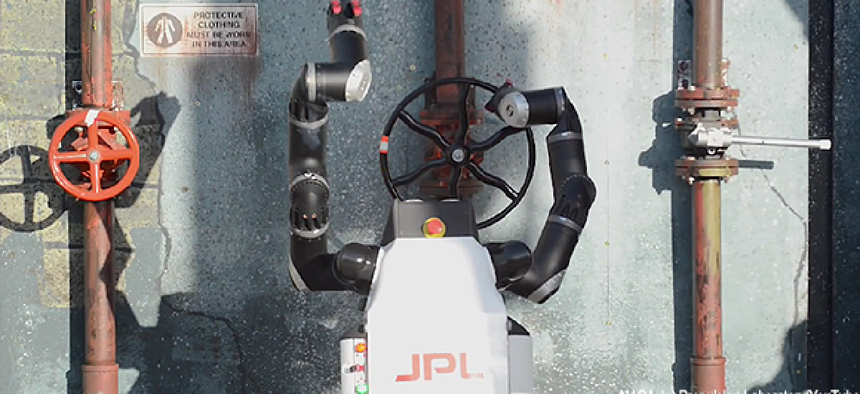Connecting state and local government leaders
As robots have gotten more sophisticated and their costs have dropped, they are now taking on new roles in the broader civilian government workspace.
It's no mystery why the military and manufacturing industries have pioneered the use of robots in the working world: Robots can work easily in places too dangerous for humans, and they can perform repetitious, mind-numbing tasks more efficiently than humans.
As robots have gotten more sophisticated and their costs have dropped, they are now taking on new roles in the broader civilian government workspace. From mechanical fish that scan ports for terrorist threats to NASA’s Robonaut 2, being trained to assist astronauts on the International Space Station, sophisticated robots are now being built for a variety of precision tasks across the public sector.
“Government programs, and especially DARPA, have really spearheaded innovation,” said Richard Mahoney, director of SRI International’s robotics program, who has kept an eye on the evolution of robots.
According to Mahoney, while the current generation of robots has been put to work primarily in roles as passive sensors, a sea change in the advancement of their abilities is about to occur. Robots are now emerging that can more actively and precisely manipulate their environments to perform tasks ranging from removing debris in a hazardous environment to repairing the outside of a spacecraft.
“I'm excited about the emerging platforms that will allow robotic manipulation, said Mahoney. “Humanoid robots with arms and hands will come out at price points more appropriate for non-military applications.”
As this next generation of advanced robots is being developed, a market for smaller, simpler robots – designed to perform focused tasks at very high efficiencies – is also growing.
“Keep it simple, put as many sensors on it as you can, as many wheels, as many ways to move around,” said Susan Eustis, co-founder of Wintergreen Research, a consulting company specializing in technology markets. Invoking the iRobot Roomba vacuum cleaner as a model, Eustis said the big value in current robots is in their ability to perform single tasks extremely well.
“Make it modular so that for any one application you just take the pieces you need, said Eustis. “You don't need to have a great big huge complex thing like Lockheed Martin would build at $5 million each.”
Apart from military and law enforcement, analysts also point to a number of public sector services that are likely to reap the early benefits of robotics; these include infrastructure monitoring, medicine, emergency response and exploration.
In order to exploit these opportunities, robot designers underscore three key areas of development they believe will be critical to expanding the tasks robots can do in the public sector.
The first is improving robots' ability to manipulate objects in a human environment. "We don't ask the world to change to adapt to the robot," said Robert Ambrose, chief of the Software, Robotics and Simulation Division at NASA's Johnson Space Center.
"The world is already mostly built for people, and that is fine. We now have the technology to build a robot that can step into the world built for humans and be an assistant."
SRI's Mahoney agrees. In fact, one of the teams at SRI is focused on developing highly dexterous low-cost robotic hands. "As better manipulation becomes available," Mahoney said, "we'll begin to see a bigger application of robotics for a broader array of applications."
The second critical area is improving robots' autonomy and ability to coordinate actions. "Right now the focus has been on customization and tailoring of platforms," said Tom Phelps, director of robotics products at iRobot, which has built a small army of robots suited to public safety missions.
But we're also seeing the use of multiple robots to respond to a situation, he added. “You may have a scenario where you need the larger robot to move and to carry things, and then you need smaller robots going to confined spaces on the same mission. So there has been a lot of focus on creating a cohesive product family so the robots can work together. In the future, we will see more collaboration with controllers where a single user can control multiple robots and address the unexpected factors that occur on a mission."
The third critical area is, not surprisingly, lower costs.
The military supports basic research in robotics challenges, but, according to Wintergreen Research’s Eustis, "there just aren't a lot of grants out there for domestic robots." To boost those efforts, she said, the federal government could support development of better energy technologies to power robots, which would help build the domestic market for robotics technology.
But it is not just researchers in the military and universities behind the robotics movement. Demand for robot systems has started to build in the developer community and among individual enthusiasts, leading some to conclude the market is ripe for an even broader expansion of personal robots.
"It was the entrepreneurial class of hobby-computer scientists that drove the personal computer revolution," SRI’s Mahoney noted. "I think the same thing is happening now in robotics. I think we're right on the verge of that commercialization."



